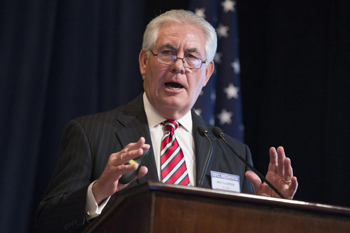Washington, Apr 28: U.S. Secretary of State Rex Tillerson said Thursday that China has threatened to impose sanctions on North Korea if it conducts further nuclear tests.

Earlier Thursday, the senior U.S. Navy officer overseeing military operations in the Pacific said the crisis with North Korea is at the worst point he's ever seen, but he declined to compare the situation to the Cuban missile crisis decades ago.
"It's real," Adm. Harry Harris Jr., commander of U.S. Pacific Command, said during testimony before the Senate Armed Services Committee.
Harris said he has no doubt that North Korean leader Kim Jong Un intends to fulfill his pursuit of a nuclear-tipped missile capable of striking the United States. The admiral acknowledged there's uncertainty within U.S. intelligence agencies over how far along North Korea's nuclear and missile programs are. But Harris said it's not a matter of if but when.
"There is no doubt in my mind," Harris said.
The Trump administration has declared that all options, including a targeted military strike, are on the table to block North Korea from carrying out threats against the United States and its allies in the region. But a pre-emptive attack isn't likely, U.S. officials have said, and the administration is pursuing a strategy of putting pressure on Pyongyang with assistance from China, North Korea's main trading partner and the country's economic lifeline.
With international support, the Trump administration said Thursday it wants to exert a "burst" of economic and diplomatic pressure on North Korea that yields results within months to push the communist government to change course from developing nuclear weapons.
Susan Thornton, the acting top U.S. diplomat for East Asia, said there's debate about whether Pyongyang is willing to give up its weapons programs. She said the U.S. wants "to test that hypothesis to the maximum extent we can" for a peaceful resolution.
But signaling that military action remains possible, Thornton told an event hosted by the Foundation for Defense of Democracies — the Washington think tank has advocated tougher U.S. policies on Iran and North Korea — that the administration treats North Korea as its primary security challenge and is serious that "all options are on the table."
"We are not seeking regime change and our preference is to resolve this problem peacefully," Thornton said, "but we are not leaving anything off the table."
Tillerson took a similar stand in the Fox News interview Thursday, saying: "We do not seek regime change in North Korea. ... What we are seeking is the same thing China has said they seek — a full denuclearization of the Korean peninsula."
In a separate interview with National Public Radio, Tillerson said the U.S. remains open to holding direct negotiations with North Korea.
"But North Korea has to decide they're ready to talk to us about the about the right agenda, and the right agenda is not simply stopping where they are for a few more months or a few more years and then resuming things," he said, according to excerpts of an interview that will air Friday morning. "That's been the agenda for the last 20 years."
Multi-nation negotiations with North Korea on its nuclear program stalled in 2008. The Obama administration attempted to resurrect them in 2012, but a deal to provide food aid in exchange for a nuclear freeze soon collapsed.
Harris told the committee that the financial sanctions imposed against the North Korean regime by the U.S. and other countries have done nothing to slow North Korea's quest for weapons of mass destruction. He also said he's been skeptical of China's willingness to exert its influence over Pyongyang. But Harris said he's become "cautiously optimistic" following recent talks between Trump and Chinese President Xi Jinping.
"It's only been a month or so and it's too early to tell," Harris said. "I wouldn't bet my farm on it."
The House GOP leadership announced late Thursday that it would vote next week on new sanctions against North Korea that would target its shipping industry and those who employ North Korean slave labor abroad.
"The time for waiting on North Korea to get its act together is over. Congress has led the effort to institute tough and far-reaching sanctions against Pyongyang," said House Majority Leader Kevin McCarthy, R-Calif.
In a show of military might, the U.S. has sent a massive amount of American weaponry to the region. A group of American warships led by the aircraft carrier USS Carl Vinson is in striking range of North Korea "if the president were to call on it," Harris told the committee. A U.S. missile defense system called Terminal High-Altitude Area Defense is being installed in South Korea.
Harris said he has adequate forces to "fight tonight" against North Korea if that were to become necessary. But the admiral also said he lacks all the attack submarines he needs and has no capable defense against the thousands of artillery pieces North Korea has assembled near the Demilitarized Zone separating North and South Korea. There are about 28,500 U.S. military personnel serving in South Korea.






Comments
Add new comment